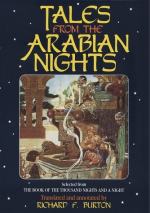[FN#15] Arab. “Al-Mafyaat,” lit.=a shady place; a locality whereupon the sun does not rise.
[FN#16] Arab. “Ja’idiyah,” a favourite word in this Ms. “Ja’ad"=a curl, a liberal man: Ja’ad al-yad=miserly, and Abu ja’dah=father of curls,=a wolf. Scott (passim) translates the word “Sharper;” Gore Ouseley “Labourer;” and De Sacy (Chrestomathie ii. 369, who derives it from Ju’d=avoir les cheveux crepus): in Egypt, homme de la populace, canaille. He finds it in the Fabrica Linguae Arab. of Germanus of Silesia (p. 786)=ignavis, hebes, stupidus, esp. a coward. Ibrahim Salamah of Alexandria makes the term signify in Syria, impudent, thieving, wicked. Spitta Bey translates this word musicien ambulant in his Gloss. to Contes Arabes, p. 171. According to Dr. Steingass, who, with the Muhit al-Muhit, reads “Ju’aydiyah,” Ju’ayd is said to be the P. N. of an Egyptian clown, who, with bell-hung cap and tambourine in hand, wandered about the streets singing laudatory doggrel and pestering the folk for money. Many vagabonds who adopted this calling were named after him and the word was generalised in that sense.
[FN#17] Ms. vol. iii. pp. 96-121. Scott, “Story of the Three Sharpers and the Sultan,” pp. 7-17; Gauttier, Histoire des trois filous et d’un Sulthan, vi. 165-176.
[FN#18] Arab. Yasrahu=roaming, especially at early dawn; hence the wolf is called “Sirhan,” and Yaklishu (if I read it aright) is from Kulsh, and equivalent to “kicking” (their heels).
[FN#19] Nusf=half a dirham, drachma or franc, see ii. 37; vi. 214, etc.
[FN#20] Bast, a preparation of Bhang (Cannabis Sativa), known in Egypt but not elsewhere: see Lane, M. E., chapt. xv. Here it is made synonymous with “Hashish"=Bhang in general.
[FN#21] Ghaushah, a Persianism for which “Ghaugha” is a more common form. “Ghaush” is a tree of hard wood whereof musical instruments were made; hence the mod. words “Ghasha” and “Ghawwasha"=he produced a sound, and “Ghaushah"=tumult, quarrel. According to Dr. Steingass, the synon. in the native dicts. are “Khisam,” “Lag-hat,” “Jalabah,” etc.
[FN#22] Said ironice, the jeweller being held to be one of the dishonest classes, like the washerman, the water-carrier, the gardener, etc. In England we may find his representative in the “silversmith,” who will ask a pound sterling for a bit of metal which cost him perhaps five shillings or even less, and who hates to be bought by weight. The Arab. has “Jauhar-ji,” a Turkish form for Jauhari; and here “jauhar” apparently means a pearl, the stone once peculiar to royalty in Persia, but the kind of gem is left undetermined.
[FN#23] Arab. “Saza, yasizu,” not a dictionary word. Perhaps it is a clerical error for “Sasa,” he groomed or broke in a horse, hence understood all about horses.
[FN#24] In the orig. “Shorbah,” Pers.=a mess of pottage: I have altered it for reasons which will presently appear.




